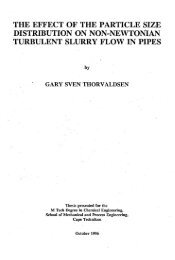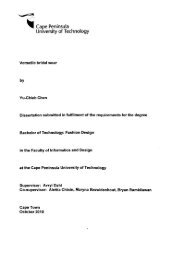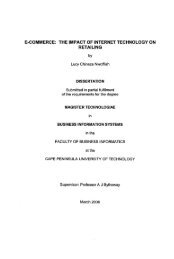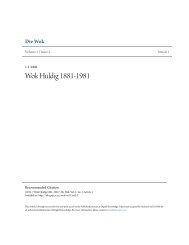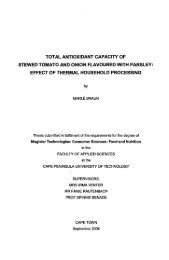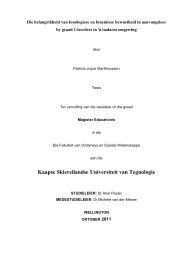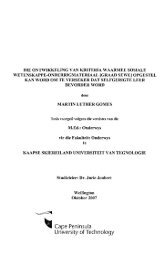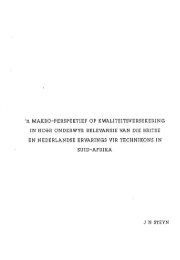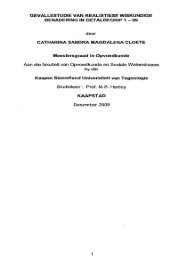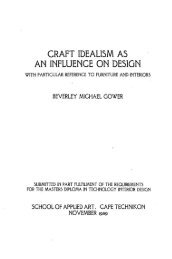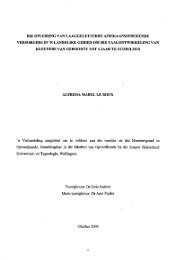an investigative analysis of the psychological characteristics and job ...
an investigative analysis of the psychological characteristics and job ...
an investigative analysis of the psychological characteristics and job ...
Create successful ePaper yourself
Turn your PDF publications into a flip-book with our unique Google optimized e-Paper software.
Carrel, et al. (1997:477) feel tha1 one <strong>of</strong> <strong>the</strong> grea1est compliments one may bestow upon<br />
employees is to ask <strong>the</strong>ir opinion <strong>an</strong>d dele9a1e to <strong>the</strong>m <strong>the</strong> authority to make decisions about <strong>the</strong>ir<br />
work.<br />
The CEL must be able to delegate tasks to his support personnel. This will install a sense <strong>of</strong><br />
confidence <strong>an</strong>d responsibility in <strong>the</strong> support personnel <strong>an</strong>d make more time available for <strong>the</strong> CEl<br />
to complete o<strong>the</strong>r tasks.<br />
2.4.17 Ability to Comm<strong>an</strong>d Pr<strong>of</strong>essional Respect<br />
The CEl must have <strong>the</strong> relev<strong>an</strong>t qualifications <strong>an</strong>d knowledge <strong>of</strong> <strong>the</strong> subject matter to comm<strong>an</strong>d<br />
pr<strong>of</strong>essional respect from his colleagues <strong>an</strong>d members <strong>of</strong> faculty. He must be able to hold his own<br />
in <strong>the</strong> pr<strong>of</strong>essional environment Awork ethic <strong>of</strong> ahigh st<strong>an</strong>dard must be exhibited.<br />
2.4.18 Ability to Motivate O<strong>the</strong>rs<br />
The word motivation comes from <strong>the</strong> Latin verb movere, which me<strong>an</strong>s to move. According to Rue<br />
<strong>an</strong>d Byars (1993:338), numerous definitions c<strong>an</strong> be found for <strong>the</strong> word "motivation'. Often included<br />
in <strong>the</strong>se definitions are such words as aim, desire, end, impulse, intention, objective <strong>an</strong>d purpose.<br />
In today's org<strong>an</strong>isations, motivation me<strong>an</strong>s getting people to exert a high degree <strong>of</strong> effort in <strong>the</strong>ir<br />
<strong>job</strong>.<br />
Arrnstrong (1996:296) elabora1es on <strong>the</strong> above. He states tha1 motivation is inferred from or<br />
defined by goal-directed behaviour. It is concemed with <strong>the</strong> strength <strong>an</strong>d direction <strong>of</strong> that<br />
behaviour. Motivation takes place when people expect tha1 acourse <strong>of</strong> action is likely to lead to <strong>the</strong><br />
attainment <strong>of</strong> a goal <strong>an</strong>d a valued reward - one which satisfies <strong>the</strong>ir particular needs.<br />
Travers (1993:44); Gibson, et al. (1994:145) <strong>an</strong>d Carrel, et al. (1997:19) also define motivation.<br />
They conclude tha1 motivation is stimulating or causing purposeful activity that is directed to<br />
satisfying needs or w<strong>an</strong>ts. It is <strong>the</strong> forces acting on or within <strong>an</strong> individual to initiate or direct<br />
59



